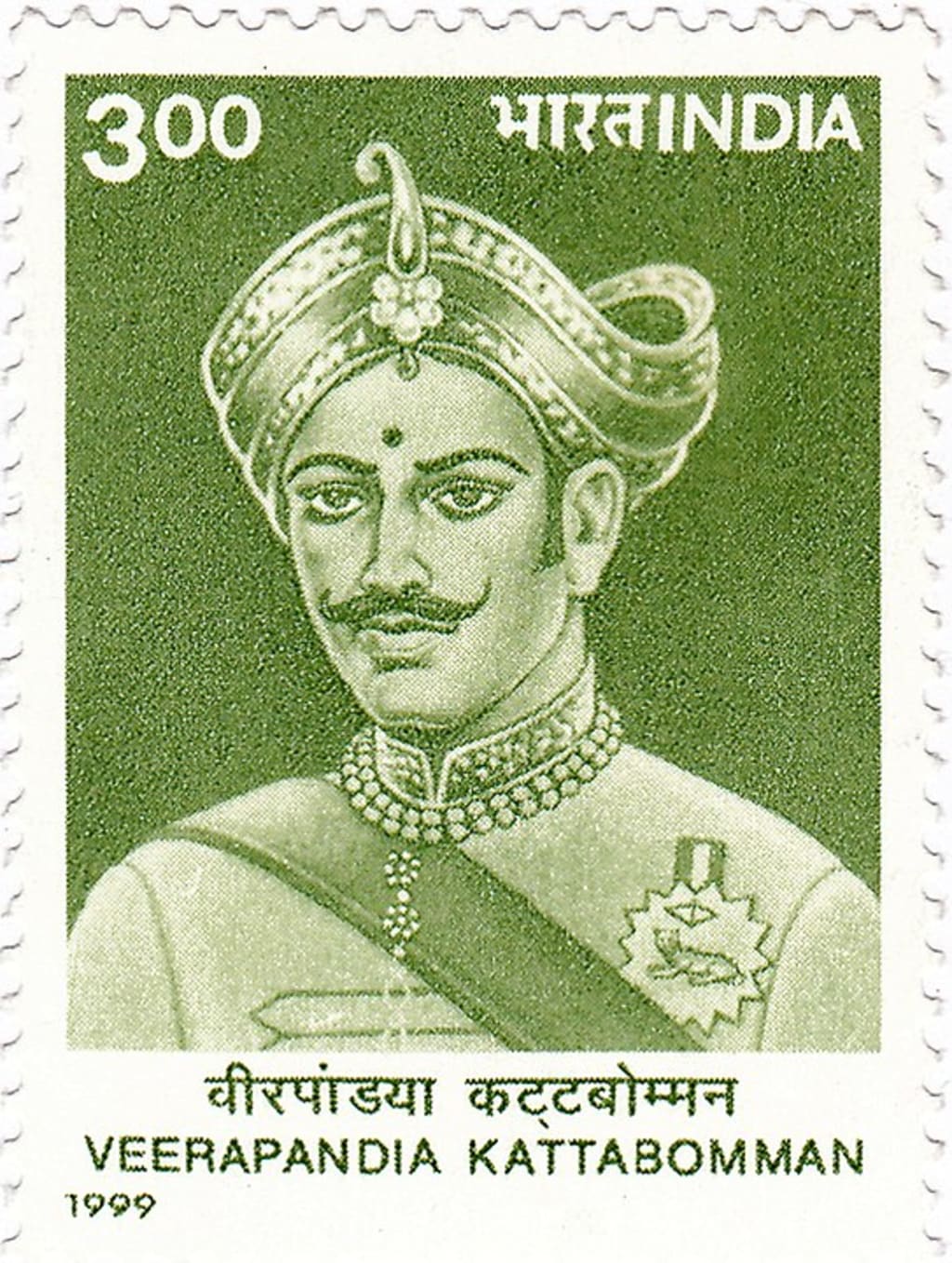
Veerapandiya Kattabomman was an 18th-century Indian warrior king and the ruler of the Panchalankurichi principality in present-day Tamil Nadu, India. He is known for his resistance against the British East India Company during the early stages of their expansion in India.
Kattabomman was born in 1760 in the Nedunchezhiyan clan of the Padaiyachi community. He inherited the throne of Panchalankurichi from his father, Jagaveera Pandiyan, and became the ruler of the principality at the age of 27. He was known for his bravery, military acumen, and sense of justice.
Kattabomman's resistance against the British East India Company began when the British demanded that he pay taxes to them. Kattabomman refused, citing that he was only a tributary of the Nawab of Arcot and not directly under British rule. This led to a confrontation with the British, and Kattabomman went on to fight against them in a series of battles.
Kattabomman was eventually captured by the British and was sentenced to death in 1799. He was hanged at Kayathar, a town in present-day Tamil Nadu. Kattabomman's bravery and sacrifice continue to inspire people, and he is considered a symbol of resistance against colonial rule.
Veerapandiya Kattabomman was born in 1760 in the Nedunchezhiyan clan of the Padaiyachi community. His father was Jagaveera Pandiyan, who was the ruler of the Panchalankurichi principality in present-day Tamil Nadu, India.
Kattabomman received his early education from a Brahmin teacher and was trained in various martial arts and warfare tactics. He also learned the Tamil language and literature, which helped him develop a deep love for Tamil culture and tradition.
At the age of 27, Kattabomman inherited the throne of Panchalankurichi after his father's death. He was known for his bravery, military acumen, and sense of justice. He ruled over the principality with great care and attention, earning the love and respect of his people.
During his early years as a ruler, Kattabomman faced various challenges, including threats from neighboring kingdoms and local chieftains. However, he managed to overcome these challenges through his courage and strategic thinking. He also became known for his fair and just rule, which earned him the loyalty of his people.
Kattabomman's early life shaped his personality and leadership style, which would later play a significant role in his resistance against the British East India Company.
Panchalankurichi was a small principality, covering an area of around 3,000 square miles. It was primarily a rural area with agriculture as the main occupation of the people. The principality was known for its fertile lands and abundant natural resources.
Under Kattabomman's rule, Panchalankurichi saw significant development in various areas, including agriculture, irrigation, and infrastructure. Kattabomman was also known for his patronage of arts and literature, and his court was a hub of cultural activities.
The principality was surrounded by various other small kingdoms and chieftains, with whom Kattabomman had to maintain cordial relations to ensure the safety and security of his people. However, his principality was also coveted by the British East India Company, which was expanding its territorial control in India during that period.
Kattabomman's resistance against the British and his fight to protect his kingdom from colonial rule remains an important part of Tamil Nadu's history and heritage.
Veerapandiya Kattabomman was executed by the British East India Company on October 16, 1799. He was hanged to death in the town of Kayathar, which is located in present-day Tamil Nadu, India.
Kattabomman was captured by the British in April 1799, following a prolonged resistance against the company's attempts to bring his principality under their control. He was charged with several offenses, including rebellion, and was sentenced to death by hanging.
Kattabomman's execution was a significant event in India's struggle against colonial rule. It was a stark reminder of the brutal methods employed by the British in their efforts to suppress any form of resistance to their rule.
Today, Kattabomman is remembered as a hero and a symbol of resistance against colonialism. His life and legacy continue to inspire people, and he is celebrated as one of Tamil Nadu's greatest freedom fighters.
About the Creator
Anitha
I’m a writer, "The Importance of Mindfulness in a Busy World" Currently trying to write a book. Writing about anything and everything






Comments
There are no comments for this story
Be the first to respond and start the conversation.